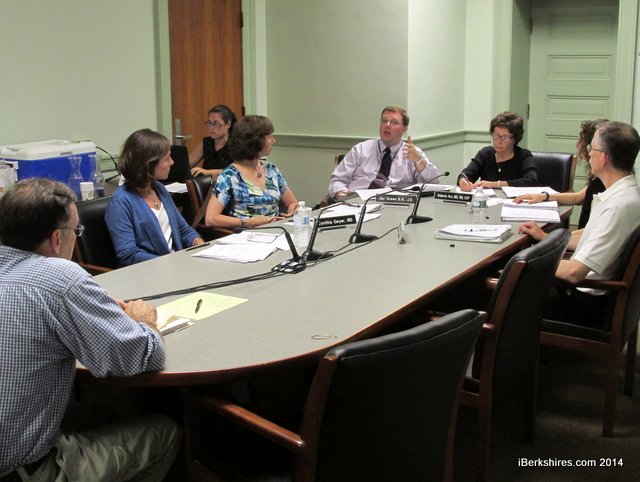Pittsfield Mosquito Control Program Sees Opposition
 The Board of Health continued to support the Berkshire Mosquito Control Project despite opposition from some residents. The Board of Health continued to support the Berkshire Mosquito Control Project despite opposition from some residents. |
PITTSFIELD, Mass. — The Board of Health has its scientific studies; residents have theirs.
Either way, the city will continue to drive a truck spraying adulticide in targeted areas to kill mosquitoes.
The city joined the Berkshire County Mosquito Control Project in 2010 in an attempt to combat such disease as West Nile virus and eastern equine encephalitis.
The control program calls for spraying "Duet" adulticide under certain circumstances. Many residents oppose the use of the chemicals and called for other options — such as the installation of bat houses.
"It is not even killing the mosquito," resident Nicki Kusek told the Board of Health. "The money being spent on this would be better spent on other ways to control the mosquito."
The program does have an opt-out clause, allowing residents to keep their property from being sprayed. However, residents are calling to end the program altogether.
"I shouldn't have to worry about the chemicals in my yard, going into my garden if it is something I don't want," said resident Stephanie Aube. "It should be on an opt-in basis."
A group of residents have continually opposed the use of the chemical citing an array of studies claiming it not only causes health problems regarding childhood development and wildlife reproduction, but that it doesn't kill mosquitoes as much as it is portrayed to.
"Not only are the ingredients in Duet proven to be harmful to our wetlands, bees and ecosystems but they are proven to cause developmental delays in small children similar to lead poisoning. And they are scientifically proven not to work," reads a letter to the board from resident Kathy Lloyd.
"The EPA has no jurisdiction and should certainly not have the final say in what is safe in our town. We have historical proof of them being wrong time and time again and our friends and neighbors have paid the price with their lives from PCB exposure, which the EPA also said was safe for many years."
Lloyd has twice submitted petitions opposing the adulticide application — one bearing the names of more than 200 people and a more recent with 60 signatures.
While those in opposition have their studies to cite, the Board of Health has its and a 40-year history of the product being used.
The board members responded to the opposition Wednesday saying the application is the last resort in a tiered program. There are certain thresholds of mosquito populations and/or disease that triggers the spraying, they said.
"This is thought out. We speak with Chris about it every year. In the winter, we look at the previous year's effect. We've been pretty good with the reduction of triple E and West Nile virus," said Jay Green, who said EEE has a 50 percent mortality rate so preventing that from spreading is of high concern.
The project recently began spraying in areas with high mosquito populations while no diseases have been confirmed — and some residents want the spraying program.
Kenilworth Street resident Sharon Shields attended Wednesday's meeting asking for her neighborhood to be sprayed. She told the board that the mosquito population in that area is overwhelming.
"We can't go outside," she said. "I am begging you to come spray those neighborhoods."
City Council Vice President Chris Connell said he has received "outcry" from residents in the Williams Street area asking for the spraying because the insect population is so high. Meanwhile, he said no one had contacted him in opposition.
Berkshire Mosquito Control Project Superintendent Christopher Horton said there is a population boom in mosquitoes right now because of recent flooding. Horton said mosquitoes lay eggs in the flood plain of the Housatonic River and when it floods, all of the eggs hatch at once.
Horton said he's received more than 100 requests for spraying from neighborhoods near the floodplains.
Residents opposing the spray are using "flawed" research, he said, by citing studies that looked at different chemicals, measured exposure at a higher rate or even studied indoor applications.
"There is research that says it works and that is what we are using," Horton said. "To say our products are dangerous and our methods are ineffective wouldn't stand a real review."
Simply put, Horton said the spread of malaria or yellow fever would never have been stopped without mosquito control programs. And after years of Duet being used, by now the concerns have been fleshed out, he said.
"There has been ample time for concerns to be fleshed out," Horton said. "That's been a long time that this stuff has been used and it has been used across the country."
Board member Cynthia Geyer said studies also show that the application has stopped outbreaks of diseases and a 2005 World Health Organization report shows there are no long-term health concerns.
With that, the Board of Health said it will continue to use the sprays to combat mosquitoes. The board expects to announce another round of spraying in the coming weeks. The sprayings are done overnight.
Tags: mosquito, mosquito spraying,
 The Board of Health continued to support the Berkshire Mosquito Control Project despite opposition from some residents.
The Board of Health continued to support the Berkshire Mosquito Control Project despite opposition from some residents. The Board of Health continued to support the Berkshire Mosquito Control Project despite opposition from some residents.
The Board of Health continued to support the Berkshire Mosquito Control Project despite opposition from some residents.